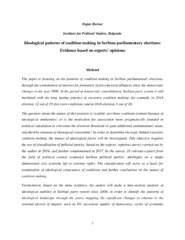Приказ основних података о документу
Ideological patterns of coalition making in Serbian parliamentary elections: Evidence based on experts' opinions
| dc.creator | Bursać, Dejan | |
| dc.date.accessioned | 2023-11-22T17:08:21Z | |
| dc.date.available | 2023-11-22T17:08:21Z | |
| dc.date.issued | 2017 | |
| dc.identifier.isbn | 978-606-12-1481-5 | |
| dc.identifier.uri | http://rifdt.instifdt.bg.ac.rs/123456789/3431 | |
| dc.description.abstract | The paper is focusing on the patterns of coalition making in Serbian parliamentary elections, through the examination of motives for formation of pre-electoral alliances since the democratic changes in the year 2000. In the period of democratic consolidation, Serbian party system is still burdened with the long lasting practice of excessive coalition making: for example, in 2014 election, 12 out of 19 lists were coalitions; and in 2016 election, 9 out of 20. The question about the nature of this practice is twofold: are these coalitions formed because of ideological similarities; or is the motivation for association more pragmatically founded in political calculation to overcome the electoral threshold or gain additional parliamentary seats, and thereby released of ideological constraints? In order to determine the logic behind excessive coalition making, the impact of ideological factor will be investigated. This objective requires the use of classification of political parties, based on the experts’ opinions survey carried out by the author in 2014, and further complemented in 2017. In the survey, 18 relevant experts from the field of political science evaluated Serbian political parties’ ideologies on a single dimensional axis (extreme left to extreme right). The classification will serve as a basis for examination of ideological congruence of coalitions and further conclusions on the nature of coalition making. Furthermore, based on the same evidence, the author will make a time-section analysis of ideological stability of Serbian party system since 2000, in order to identify the patterns of ideological landscape through the years, mapping the significant changes in relation to the external factors of impact: such as EU accession, quality of democracy, cycles of economic crises and the issue of Kosovo - all the question that presumably could have the prevailing impact on the political and party dynamics in Serbia. | sr |
| dc.language.iso | en | sr |
| dc.publisher | Lucian Blaga University of Sibiu Press | sr |
| dc.rights | openAccess | sr |
| dc.rights.uri | https://creativecommons.org/licenses/by/4.0/ | |
| dc.source | Politics & Society: perspectives on democracy and governance in the 21st century (eds. D. Dragoman, A. Zamfira) | sr |
| dc.subject | Serbia | sr |
| dc.subject | elections | sr |
| dc.subject | political parties | sr |
| dc.subject | ideology | sr |
| dc.subject | coalition making | sr |
| dc.subject | expert survey | sr |
| dc.title | Ideological patterns of coalition making in Serbian parliamentary elections: Evidence based on experts' opinions | sr |
| dc.type | bookPart | sr |
| dc.rights.license | BY | sr |
| dc.citation.spage | 7 | |
| dc.citation.epage | 32 | |
| dc.type.version | publishedVersion | sr |
| dc.identifier.fulltext | http://rifdt.instifdt.bg.ac.rs/bitstream/id/11828/Bursac_Sibiu2017_Ideological_patterns.pdf | |
| dc.identifier.rcub | https://hdl.handle.net/21.15107/rcub_rifdt_3431 |

